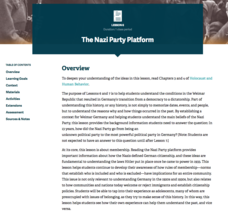US National Archives
WWII: Western Europe 1939-45 – Invasion
Without the benefit of history, Western Europe in the 1940's had no idea what was about to befall them. Class members use primary sources, including political cartoons, videos, and internal documents, to analyze how much of a threat...
National Endowment for the Humanities
Lesson 2: The United States, France, and the Problem of Neutrality, 1796–1801
While the French Revolution could be considered inspired by the American Revolution, it created thorny problems for the new United States. Should the United States get involved and be drawn into a European drama? Was the US strong...
National Endowment for the Humanities
Lesson 3: Britain, Napoleon, and the American Embargo, 1803–1808
While the French were once the allies of Americans, the Napoleonic Wars saw the United States almost drawn into a war with its one-time friend. Wars in Europe threatened to draw in the early republic. A primary source-based activity...
National Endowment for the Humanities
Lesson 1: The United States Confronts Great Britain, 1793–1796
After the Revolutionary War, the success of the United States was far from guaranteed. Foreign powers coveted the new land, and Great Britain challenged American sovereignty. Learners consider the challenges facing the new nation using...
PBS
The Meaning of the Fourteenth Amendment
The Fourteenth Amendment was extremely important to civil rights and is a crucial one to remember. The resource teaches about the Supreme Court decisions related to the amendment through writing exercises, reading, and working in small...
Jamestown-Yorktown Foundation
Why Did Some Colonial Virginians Seek Independence?
To understand the reasonings of those colonials who sought independence from England, young historians are divided into content groups that examine documents related to either the Boston Tea Party, the Yorktown Tea Party, Tea Overboard,...
Jamestown-Yorktown Foundation
How Did Relations between Britain and the Colonies Change after the French and Indian War?
What does the French and Indian War have to do with the American Revolution? Following the war, Britain issued the Proclamation of 1763 in an attempt to limit the colonists' western expansion. To understand how the proclamation, the...
Jamestown-Yorktown Foundation
Why Did Some Colonial Virginians Continue to Support the King?
Not all colonials supported the American Revolution. A resource from the American Revolution Museum at Yorktown ask young historians to investigate the reasons why some colonial Virginians were loyalist and continued to support King...
Facing History and Ourselves
The Nazi Party Platform
Not all party platforms stay democratic. A resource covers many political issues in Germany during the time of World War II, and teaches pupils about the Nazi party platform and what went wrong. Individuals participate in a warm-up...
PBS
Using Primary Sources: Wide Open Town
A picture speaks a thousand words, no matter how old! Scholars use political cartoons from the era of Prohibition and the Temperance Movement to analyze what, a primary document (in this case, a bootlegger's notebook) is telling them...
Council for Economic Education
The Economics of Income: If You’re So Smart, Why Aren't You Rich?
If basketball players make more than teachers, why shouldn't learners all aspire to play in the NBA? Unraveling the cost and benefits of education and future economic success can be tricky. Economic data, real-life cases, and some...
Helena-West Helena School District
I Know Why the Caged Bird Sings Instructional Unit Plan
Maya Angelou's first autobiography, I Know Why the Caged Bird Sings, demonstrates both the author's exemplary writing and the themes of gender and racial injustice that perpetuate beyond the limits of the 20th century. Use a thorough...
Council for Economic Education
Federal Budget Lesson Plan and Fiscal Ship Student Game
The federal budget has never been so fun! Using an interactive game, high schoolers choose from a variety of policy options after identifying goals and try to balance these changes in policy with a federal budget.
Society for Science & the Public
Easter Islanders Made Tools, Not War
When studying artifacts, especially tools, how do archaeologists determine what the devices were used for? In what ways might researchers' previous experiences influence their perception of an artifact? An article about researchers'...
Council for the Curriculum, Examinations and Assessment
Victorian Historians
Take the class back in time to the Victorian Era! The resource provides a plethora of activities that create experiences for scholars in class. Some activities include a fun fair, viewing the starry-night painting, and even experiencing...
University of Pennsylvania
Mock Trial of Alfred Dreyfus
What if scholars based mock trials on history? The fourth installment of a five-part series on the Dreyfus Affair asks learners to read various pieces of evidence before conducting a mock trial for a French officer. Teams answer...
University of Pennsylvania
From the Dreyfus Affair to the World Today
Historical events do not occur in a vacuum. Such is the case of the Dreyfus Affair, where the connection between Captain Alfred Dreyfus, Emile Zola, and Hannah Arendt is fused by the events of the early 20th century. The informative...
YMCA
Turning Courtrooms into Classrooms
Turn the class into the next episode of Law & Order! Scholars work together to create a mock trial over the course of several weeks before going before a judge for the case performance. They take on different roles, go through...
American Psychological Association
Top 20 Principles from Psychology for PreK–12 Creative, Talented, and Gifted Students’ Teaching and Learning
Who knew getting a better grasp on learning and psychology requires understanding only 20 principles? The resource, especially ideal for high school Psychology, discusses 20 important principles that debunk common myths and provide...
Federal Reserve Bank
Once Upon a Dime: High School Lesson Plan
Who knew that fairy tales and economics go hand-in-hand? Pupils complete a host of handouts, using everything from graphic organizers to short answer questions to reinforce concepts. They also complete a project that builds on everything...
Smithsonian Institution
John Brown’s Legacy
So who exactly was John Brown? John Brown fought for abolition during the Civil War. Scholars learn all about his legacy through the variety of activities in the sixth of 15 lessons, including viewing and analyzing primary source...
Council for Economic Education
Balance of Payments (BOP)
Have you ever checked your clothes to see how many nations created them? Pupils take a deeper look at international trade and the balance of payments nations have with one another. They use calculations, simulations, and primary sources...
American Bar Association
News Literacy Model Curriculum in Social Studies
Scholars investigate news literacy in the twenty-first century. They use technology, legal decisions, writings, and digital privacy to analyze the topic. Using what they learned, a group assignment looks into both the challenges and...
Council for Economic Education
Tax Time Scavenger Hunt
Is a 1040EZ tax form really easy? Scholars investigate the complexities of the United States taxation system with an economics lesson. Using a wide variety of web sources, they interpret IRS taxation rules and regulations to better...

























